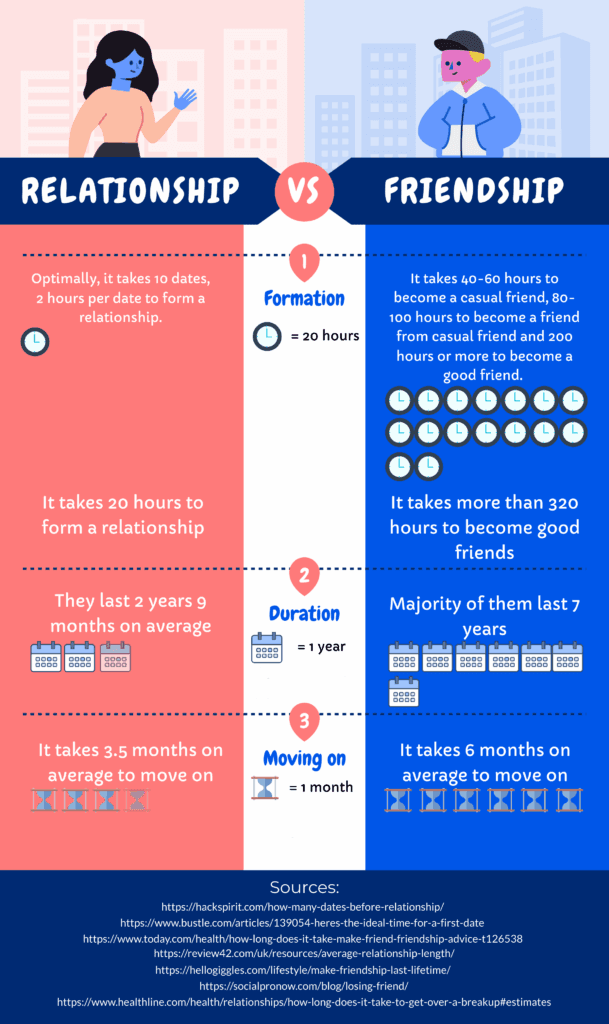Platonic relationships in American culture are rarely just about friendship. Instead, they exist under constant scrutiny. Friendships are overanalyzed, oversexualized, and often short-lived. While many people claim to value close, non-romantic connections, the cultural scripts surrounding gender, intimacy, and power make these friendships difficult to sustain.
Across cultures, platonic relationships look radically different. In the U.S., they tend to collapse under the weight of assumptions: that all intimacy must lead to sex, that men and women can’t connect without desire, or that emotional closeness means you owe someone something. We prepared a short ethnography on heterosexual platonic relationships around the world to get a better understanding of what these relationships look like and what we wish we could see in the United States.
1. Platonic Relationships in the U.S. Are Built on Boundary Anxiety
The phrase “just friends” often comes with an eye roll. Americans approach platonic relationships with a unique paranoia: what if they catch feelings? What if the other person already has? This cultural discomfort makes every moment in a cross-gender friendship feel like an accidental audition for romance.
One reader, who described themselves as a closeted emotional overthinker, noted: “Platonic friendships work, so long as the boundaries are Extremely Clear!”
The American cultural insistence on rules like check-ins, disclaimers, and double meanings suggests that emotional closeness without romantic expectation is seen as unnatural (Karandashev 2015). This differs starkly from cultures like Germany, where friendship unfolds slowly and formally, but without constant clarification. In Mexico, platonic relationships can involve open affection and shared warmth, and yet touch does not imply romantic intent. By contrast, Americans often rely on awkward verbal boundaries to avoid the fear of “leading someone on.”
2. American Intimacy Scripts Are Romance-Obsessed
emotional connection only from partners. Friends are often treated as emotional placeholders—supportive, sure, but not central. A reader who referred to themselves as “a sentimental analyst who always misreads vibes” explained:
“I’ve been struggling to form platonic friendships. In my experience, this just doesn’t happen without suspicion.”
This suspicion is not universal. In South Korea, same-gender friendships are highly structured and status-bound, but loyalty is earned through acts over time. In China, relationships, even platonic friendships, tend to follow duty and role-based logic, reducing ambiguity but also limiting casual closeness. But American culture sits in a strange middle: people crave intimacy but are socialized to pair it with desire or exclusivity. This makes platonic relationships emotionally dangerous and culturally unsupported especially between heterosexual men and women.
3. Cultural Signals of Friendship and Attraction Are Too Blurry
One of the biggest barriers to platonic relationships in the U.S. is the lack of clear social signaling. Many people simply can’t tell the difference between affection and flirtation, between presence and promise.
A reader who called themselves “a former flirt turned friend-zoner” said:
“Platonic friendships are easy when you have actual standards and know what you want and don’t want out of a partner.”
This comment unintentionally reinforces the problem. American culture has few models of emotional closeness that don’t eventually get filed under “friend zone” or “missed romantic opportunity.” Other cultures have more distinct cues. In Japan, mixed-gender friendships after a certain age are rare and highly contextual. In Nigeria, religious and social frameworks often discourage platonic intimacy altogether, particularly if it crosses gender lines.
In contrast, American culture encourages ambiguous touch, sarcasm-as-flirting, and emotionally charged texting but with little agreement on what any of it means. This ambiguity generates confusion, disappointment, and in many cases, the eventual collapse of what could’ve been healthy platonic relationships.

Conclusion: The Benefit of Platonic Relationship Bonds
Platonic relationships offer something rare in American intimacy culture: sustained emotional connection without performance or pressure. While they don’t produce the dopamine highs of romantic novelty, they activate the same neurobiological systems of trust and attachment particularly oxytocin, which supports safety, co-regulation, and long-term well-being.
The challenge isn’t that Americans can’t handle friendship. It’s that many have been conditioned by dating apps, media scripts, and reward-driven behaviors to chase romantic intensity over relational stability. To value platonic relationships is to retrain attention on mutual benefits, redefine closeness, and choose connection that doesn’t need to be sexual to be profoundly meaningful.











